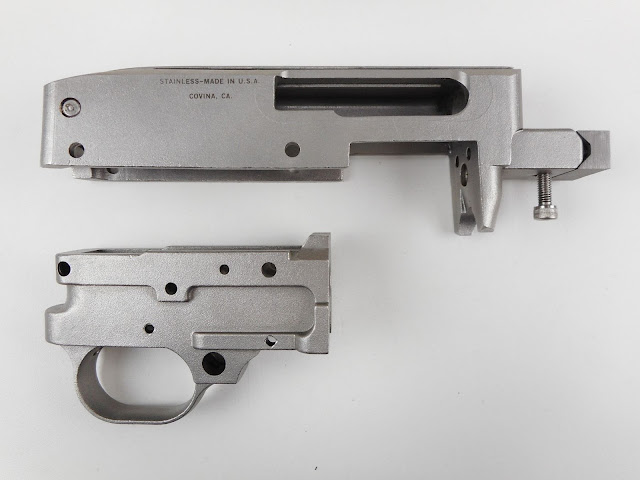There is an old saying that imitation is the sincerest form of flattery, and I believe that to be true. It could also be a sign of the lazy.
When it comes to firearms, we see a lot of flattery (or laziness) going on. Take the Mauser rifle, the design was so good that nearly every bolt action rifle since has an element of the Mauser in their design. Maybe this is because there is no better way to design a bolt action rifle?
When it comes to 22 self-loading rifle designs, there have been many, but few if any have been copied, cloned or duplicated as much as the venerable Ruger 10/22.
To me it says that those gun makers could not come up with a better rifle on their own.
Some could say and with good argument that the aftermarket support for the 10/22 made it a no-brainer to copy the rifle, get in on the demand that exists for 10/22 rifles and parts.
Similar to how the AR-15 market has evolved. Show me a gun maker who isn't making an AR-15 variant and I'll show you a company who has at the very least thought about it.
Back to our topic....
Over the years Ruger's lawyers have spent considerable time and effort protecting the copyright and patents of the 10/22 and today we will take a look at all the copies, clones and tributes.
The first one came from Southern California gun maker AMT (Arcadia Machine and Tool). The company was building a variety of handguns and in 1984 decided to make a copy of the Ruger Mark II pistol and the Ruger 10/22 rifle. They named the firearms "Lightning".
They contracted with Butler Creek to supply the synthetic Monte Carlo and folding stocks along with their plastic 25 round magazines.
To stand out from the Ruger 10/22 they made Lightnings in stainless steel, a trademark of AMT guns. Another possible improvement (depending on your point of view) was a machined in scope rail on the top of the receiver.
The trigger housing and barrel band were made from cast aluminum.
A target model with a walnut stock was also produced, but those are quite rare. In addition, there were also some precision rifles made by a subsidiary/partner called Diamond Precision Arms.
Allegedly Ruger's lawyers were successful in stopping the production of the Lightning pistols by agreeing to allow the production of the rifles (or vice-versa?). It is not clear if this included a licensing agreement and/or payments to Ruger. Either way AMT ceased production of the pistols.
By 1994 AMT ended production of the Lightning rifles as well.
A few years after AMT began producing their stainless copy of the 10/22 another west coast gun maker started making some as well. Olympic Arms, just north of Olympia Washington started making machined stainless receivers in 1987. They produced both rifles and pistols and gave them the name "X-Ring" (a name now used by Tactical Solutions).
It is very difficult to find data or pictures of these guns, in fact the only one I could find was the one below, taken by yours truly. I owned this pistol for a while.
Olympic Arms also made the barrels which were said to be quite precise and were used to take numerous wins in shooting competitions. Bell and Carson stocks were used on the finished guns.
Ruger sent cease and desist letters in August of 1997, the letter talked of their success in getting AMT to cease production.
Rather than fight a legal battle Olympic suspended production after just 200 or so rifles and an unknown number of receivers and pistols were made. A fire supposedly destroyed the records.
After the year 2000, some companies began producing replacement receivers for the 10/22. Ruger was either powerless to stop them or just gave up trying. This opened the flood gates. See my post on replacement 10/22 receivers here.
In 2012 Magnum Research, the guys that brought you the Desert Eagle, began producing a 10/22 copy. They call their version the "Magnum Lite", they also produce a left-handed version called the "Switch Bolt".
Two years later, in 2014, Filipino arms maker Armscor began marketing a 10/22 clone called the RIA22. The price point was well below what the Ruger 10/22 worked hard to achieve (like $100 lower). This is probably what made the folks at SR&C take notice.
The story goes that Ruger's lawyers filed a lawsuit which ended the importation and probably the production as well, the rifle is no longer listed on their website.
From what I understand the argument was that the RIA22 was not merely the same mechanically, but cosmetically as well, it was a 100% clone, while the Magnum Lite above is only mechanically the same.
In 2018 Thompson/Center Arms introduced a 10/22 clone. If you didn't know, Thompson/Center is owned by Ruger rival Smith & Wesson. You could say this is ironic, a rival company who often made fun of Ruger (and has been since Ruger's start in 1949), making a copy of Ruger's flagship .22.
The copying other designs is a long-standing tradition at Smith & Wesson.
For years the team at Volquartsen has been producing high end replacement parts for the Ruger 10/22. They then moved into making 10/22 replacement receivers and it was a short trip to producing complete rifles.
The same is true of Tactical Solutions, producing high quality aftermarket upgrades led to the making of complete rifles.
Spanish arms maker Bergara introduced a 10/22 clone in 2021 that includes their world-famous barrels. They call the rifle the BXR
Many may ask why I have a problem with these companies building copies or clones of the 10/22.
Why not ask: What if?
What if these companies instead of copying the 10/22, resurrected other worthy designs? There are dozens of good 22 autoloading rifle designs that are going unused. Many are great designs that these makers could revive and even improve upon. Instead, they copy Ruger and make a belly button rifle. I have listed some examples below:
The Remington Nylon 66 was popular when the 10/22 was introduced. It is now a collector firearm with a cult following. By building this gun you would not only revive a classic but provide Nylon 66 owners the much-needed parts they may need to fix their guns.





























No comments:
Post a Comment